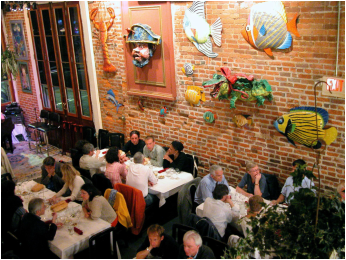 MorgueFile - by clarita
MorgueFile - by clarita New research from UK's University of Bristol suggests people who eat more slowly feel fuller and think they have eaten more than those who eat quickly.
Previous studies have found that slower eaters have a lower body mass index than those who gobble down their grub. I've always been slim, which I put down to good genes and high metabolism. I won't bore you with a whine about the way ageing has changed my shape in the stomach area. It happens to everyone, Francene—get over it.
 MorgueFile - by xenia
MorgueFile - by xenia To investigate whether our rate of eating influences how hungry we feel afterwards, University researchers fed forty volunteers canned tomato soup through a tube into their mouths.
The participants then had 400ml of soup pumped into their mouths at two rates—a fast and a slow rate. Those with the fast rate were given a four second pause between sips and the slower rate group's sip was followed by a ten-second pause.
The volunteers (probably starving students), who were paid £15, were then asked how full they felt at the end of the meal and two hours after.
Those who took the soup more slowly said they felt fuller than the fast eaters both immediately after the test and two hours later.
The slow eaters overestimated how much they had eaten.
This is how I feel when I'm halfway through my meal. I could easily leave the rest of the food on my plate uneaten—probably would do so if I was alone. However, my husband would only ask, “What's the matter? Didn't you like it?”
Just before the meal, aromas drift from the kitchen, which makes me hungry.
But environmental prompts at irregular times, such as the smell of our favourite food cooking, can throw us off course by stimulating our appetite and leading us to eat even when we don’t feel hungry.
A researcher at Harvard University, who was unconnected with the new study, said as well as our own perception of hunger, hormones in the stomach have a role to play in our feelings of fullness.
The hormone leptin, which is produced by fat cells, sends a signal to the brain based on how much fat we have just eaten and how much is stored in our body.
Other hormones are produced by the stomach based on how ‘stretched’ it feels.
Research has shown that leptin - together with the other hormones - then interacts with the ‘feel-good’ hormone dopamine in the brain to create a feeling of pleasure and fullness after eating.
So now it's time to think about the way you eat. Fast or slow? Do you notice the way the rate if your eating affects you?





 RSS Feed
RSS Feed
